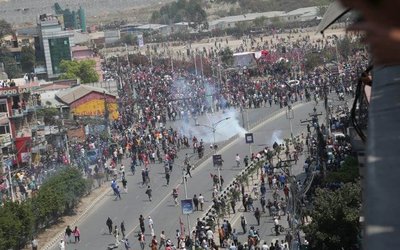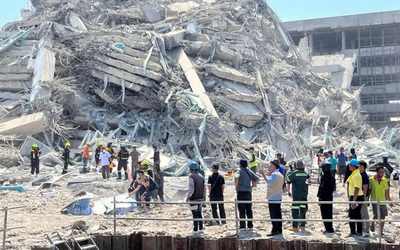
Now the new Constitution has completed its third year. What do you say about its real worth? Do you believe it is serving its purpose?
Yes, this is a good constitution. I don't say it is a perfect constitution. As they say, perfection is the enemy of good. I don't find anybody anywhere in the civilized world claiming that they have the perfect constitution. You can say in the given situation, this is the best we could hope for. When you draft a constitution as document of compromise, this is what happens. If you don’t want to compromise, do not go for a participatory constitution building process. We have a constitution drafted by the Constituent Assembly. It took almost seven years to work it out, and it was finally passed by more than a 90 percent majority in the Assembly. It was not possible to create a unanimous constitution. It was not the requirement either. Democratically, whatever was created is here for all. And it is being implemented. I am sure its acceptability will increase once people start observing the change that it is aimed at bringing.
Does it mean that you don't find any issues in the Constitution?
This is not my argument. No constitution can satisfy everybody. But you can have a constitution that satisfies most people. There are always some unmet demands. These demands keep the constitution building process alive even after its promulgation. Your comment on the Constitution usually also depends on who you are and what you want that others do not. This is always there. As a student of constitutional law, I also have many comments about the Constitution. But my comments are not political.
What are these apolitical comments?
We have a lengthy draft of the constitution. It could have been reduced by half. It is full of wordiness, and repetitions, and many provisions could have been avoided.
I also have some comments in terms of its contents. For example, the bill of rights in the Constitution could have been streamlined and solidified so that their implementation would not require creating new laws. The schedules of division of powers between the federation, provinces and local governments could have been made more succinct, and likely overlaps could have been avoided. It was possible to make the fiscal federalism more efficient in terms of constitutional provisions. The number of constitutional commissions could have been lessened. Similarly, efforts could have been made to make political parties inclusive and the system of proportional representation more scientific. Obviously, there were opportunities for the nation that remained unfulfilled.
What are the pressing constitutional issues at present?
We have been observing some issues relating to centre-province relations. Most of the chief ministers in the provinces have found the role of the federal government in facilitating transition less than reasonable. There have been issues regarding unfair distribution of resources amongst the provinces and local governments. There is a huge concern that the enabling laws passed under Article 47 of the Constitution to implement fundamental rights have been created without giving an opportunity to the stakeholders to work collaboratively. Impeachment scandals of Supreme Court Chief Justices Sushila Karki and Gopal Parajuly and the confirmation hearing process regarding Acting Chief Justice Deepak Raj Joshi also proved offensive. There might have been some political overtones, but these issues must be evaluated seriously to avoid hiccups in constitutional implementation and unnecessary politicization in the future.
Are the indigenous people and minority groups receiving what the Constitution has promised them so far?
There is a change in the scenario of indigenous people and minority groups, obviously. Those provisions in the Constitution that provide support to the disadvantaged groups of society (on inclusion, diversity, socio-economic and cultural rights, affirmative action, protection of identity, etc) must be adequately focused upon. The most deprived and marginalized communities must find the Constitution to their advantage, and this requires well-organized implementation of laws. The right to proportional inclusion guaranteed to various groups under Article 42 (1) must be implemented vigorously. The real change will come with consistent and rigorous implementation of the Constitution.
What about the past elections? Do they give some lessons to political analysts?
They were very important but were not carried out quickly and efficiently. The government needs to see whether or not the electoral provisions are delivering what they were intended to. The results of the three tier elections held in 2017 under the new Constitution must be reviewed to ensure that the electoral system protects the concerns of the people who have been deprived of representation. Legal reforms should be initiated where necessary. The laws regarding political parties and proportional representation should be guided by best interest of indigenous people and other marginalized groups.
Some critics think the federalization initiatives have not been rapid and efficient. Do you think so?
I think the critics have a point. The federalization initiative must get a boost to make it faster and effective, as the work thus far has been unsatisfactory. The delays have been due to the enormity of the task ahead and our capacity to work out the necessary laws and procedures. However, proceeding with the task is the only option. The government should continue to work with provinces and local governments to complete the unfinished task and urgently address the transition. More model laws are necessary as references for the local and provincial governments' usage. The federal government should arrange to help develop the necessary knowledge and skills. We need to urgently fulfill the staffing requirements of local and provincial governments and effectively transfer power.
What about the Judiciary? Is it up to the mark?
I think there are some problems here too. The Constitution Bench created by the new Constitution is almost dysfunctional. It has to be activated by creating the required laws and procedures and by ensuring that there are efficient judges who will assume the responsibility of federal issues. Again, the government should pioneer the legal reforms regarding the Judicial Council and Constitutional Council and ensure quality in judges' recruitment, transfer, disciplinary action and dismissal. The law to regulate parliamentary hearing should also be enacted to ensure that legal standards are met, keeping in view the parliamentary system of the government that we have adopted.
What about the recently enforced third generation of the National Codes of Nepal? Are they going to assist the rule of law in the new constitutional system?
The five new codes that have been instituted recently are remarkable developments in Nepal. They are as important as the new Constitution with regards to change and modernization. This is the first time that we have a very up to date civil code, penal code, civil procedures, criminal procedures and a statue on determining sentences and their implementation. These codes also reflect on our experience during the last seven decades and integrate the legal norms and standards scattered about. They will certainly assist to the rule of law in the country.
What are the improvements made to these codes?
The National Code of 1963 was a very complicated law. It was structurally disorganized and full of archaic language. There were lengthy sentences, and it was incoherent as well. Although it was qualitatively better than the National Code of Prime Minister Jung Bahadur Kuwar promulgated in 1854, it did not reflect contemporary requirements. Many legal practitioners thought that the 1963 National Code was tough because of conflicting interpretations. So, these five new statues have major advantages over what existed under the 1954 National Code.
Could you provide some examples?
There are many. The new civil code is better in the matter of contracts and agreements. It has introduced the law of tort in Nepal for the first time, as was necessary. It additionally deals with regulations in the matters of religion and law. There is clarity in the concept of the right to property. Nepalese traditions have been expressed according to the modern legal thinking, and criminal law and procedures have been wonderfully drafted. Yet, all these new features build on what we experimented before.
Although Nepal has long legal traditions, it never had a law that stated that ignorance of the law is no excuse. It never stated that nobody may work against the public interest. Similarly, the law of Nepal never maintained that a wrongdoer should be liable for compensation, including the provision that people should live maintaining good neighborliness. Of course, the law courts took these principles for granted, but the statues didn't mention these simple principles in their legal provisions. Now, they do.
What are the challenges relating to implementation as far as fundamental rights are concerned?
The problem with the implementation of fundamental rights is not as simple. If you go by the Constitution, between Articles 16 to 48, there are 33 articles that deal with fundamental rights of citizens of Nepal. Many of these provisions apply to non-citizens as well. Among them, more than half are concerned with the economic, social and cultural rights of the Nepalese people. Each right has several other inherent rights as well. So, when the Constitution guarantees the rights to a healthy environment, education, employment, health, shelter as well as the rights of elderly people, social security and social justice, they are only the broad categories. Each such right has several components within it. The role of enabling laws in working out the details is, thus, crucial.
Why are they crucial?
Some rights clearly mention that they will be implemented by enacting new laws. Some do not mention this. However, there are very few economic, social and cultural rights that could be implemented without creating the required laws. The task of creating laws is again dependent on the resources available to the government. While the government has a challenge to harmonize these rights (for example, the right to workers' participation in management with the right to collective bargaining), it has also to meet the competing claims of each right and work for their progressive realization, keeping in view the financial resources available.
Are provincial governments responsible for these rights?
These rights are guaranteed against the State. The Constitution does not define what is meant by "State." But it is clear that all three levels of government are responsible for implementing fundamental rights. This is a challenge. Several laws were passed early this week to implement fundamental rights, but these instruments were finalized by the federal government at its own initiation. The provincial and local governments were not consulted. But, as I explained, they are responsible to the citizens in the matter of their implementation.
With so many issues on board, do you think the government will be able to handle the implementation of fundamental rights smartly in the days to come?
I think Prime Minister Oli has shown his willingness to work on all these issues. He might also consider creating a Constitution Implementation Commission to study operational matters, policy issues and submit recommendations to the government. It is important that such a body has the necessary representation from major political sectors. This can help the process of reform as well.
What is your message for the parties who have a plan to observe "black day" today?
They can go ahead with their plan. This will help them to keep up with whatever little political space they have at present. It is however important for them to work with the mainstream political parties, especially the ruling party, who alone can bring further reforms at this stage, if they are convinced. However, I must emphasize here that the whole country, including the three tiers of government and the public, needs to focus on the implementation of the Constitution more than anything else at this stage. This is important for the planned transformation of the country.
- Police Fired Tear Gas To Control Pro-Monarchst Movemnet In Tinkune
- Mar 28, 2025
- KTTOAN 2025 Night Held In Kathmandu
- Mar 28, 2025
- 'High Security Surveillance' To Prevent Clashes between republican and royalist demonstrations
- Mar 28, 2025
- Weather Forecast: Partly Cloudy In Pokhara And Rain In few Places Of Hilly Areas Of Gandaki And Koshi
- Mar 28, 2025
- Global IME Bank and IFC partner on digital transformation and embedded finance advisory
- Mar 27, 2025















